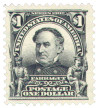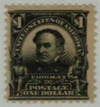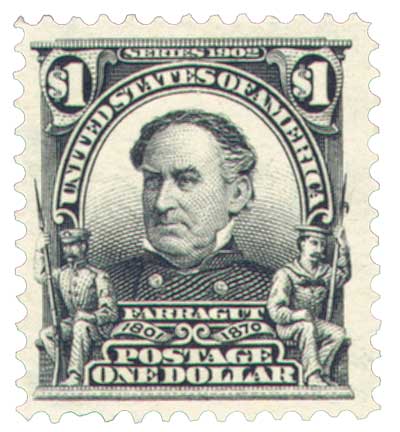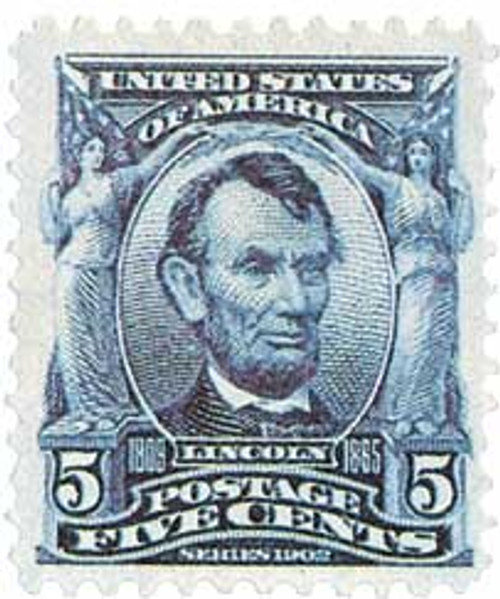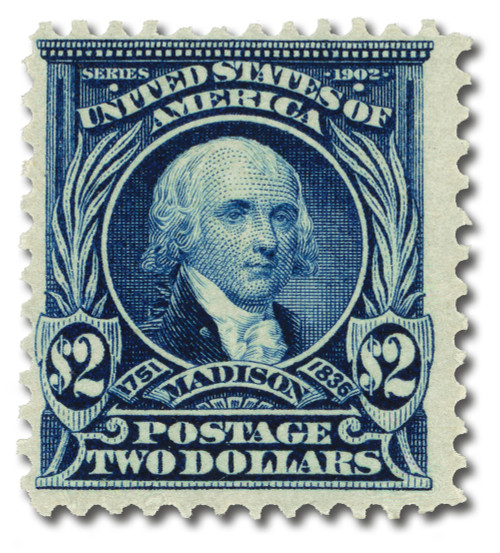
# 311 - 1903 $1 Farragut, black
Series of 1902-03 $1 Farragut
Quantity issued: 504,374
Printed by: Bureau of Engraving and Printing
Method: Flat plate
Watermark: Double line
Perforation: 12
Color: Black
Birth of David Farragut
Born to a veteran of the Continental Navy, Farragut’s first name was initially James. After his mother died from yellow fever, Farragut’s father sent him to live with friends in 1808, whom he believed would provide better care. So Farragut was raised by naval officer David Porter and was a foster brother to David Dixon Porter and William D. Porter. In 1812, Farragut adopted David as his first name in honor of his foster father.
Farragut began his naval career at the age of nine as a midshipman. Within two years he was a prize master and then served aboard the USS Essex during its capture of the HMS Alert. From there, he went on to aid in the establishment of America’s first naval base and colony in the Pacific, Fort Madison.
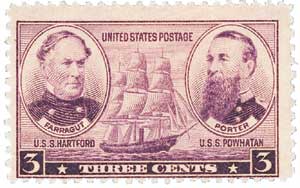
After the War of 1812, Farragut served on various ships, mostly in the Mediterranean. In 1823, he sailed to the Caribbean to help fight pirates, and during the Mexican-American War, he saw duty on both sea and shore. Following that war, he was tasked with establishing Mare Island Navy Yard in California.
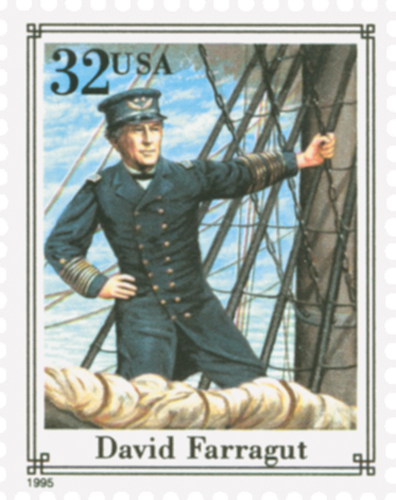
At the outbreak of the Civil War, Farragut showed his loyalty to the Union when he gave up his home in Norfolk, Virginia, to fight for the North. He was then placed in command of the campaign to capture New Orleans and gain control of the Mississippi as part of the West Gulf Blockading Squadron. He took the USS Hartford as his flagship.
On April 18, 1862, the ships began bombing two forts near New Orleans. The bombardment lasted for five days with no signs of progress. Farragut was commanding the squadron and decided to sail past the forts at night. His successful plan forced the surrender of Fort Jackson, Fort St. Philip, and New Orleans. For two years he blockaded the Gulf Coast and controlled river traffic.
In 1864, the Confederacy still held the port of Mobile Bay. It was heavily mined with anchored bombs known as torpedoes and protected by two forts. That August, Farragut was ordered to capture Mobile Bay. When his ironclad Tecumseh was sunk by a torpedo, Farragut was warned that Fort Morgan’s guns, as well as those from the Confederate Tennessee, were directed at his fleet. “Damn the torpedoes,” he replied, “Full speed ahead!”
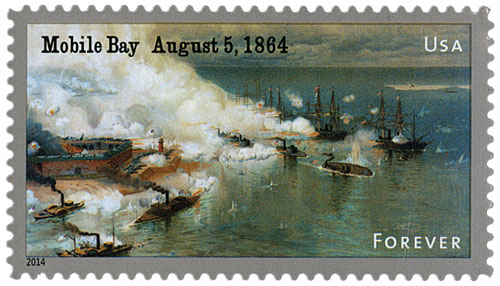
Watching the enemy approach, Confederate Admiral Franklin Buchanan readied his flagship, the ironclad CSS Tennessee. Mobile Bay was the last Confederate-controlled port east of the Mississippi and Buchanan had to defend it.
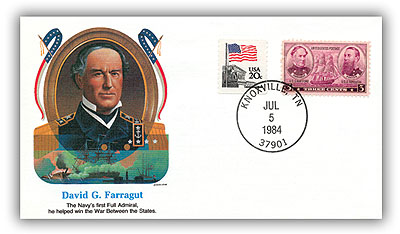
Buchanan faced off with Farragut. A direct collision would sink both ships, but the Hartford veered at the last second. The two ships passed so close that the men shouted insults, and a Confederate bayonet speared a Union sailor. Once past the Hartford, the fearless Tennessee was surrounded by the Union fleet and pressed to surrender.
Although the battle lasted only three hours, the Union victory at Mobile Bay was significant. With the Union Army at her gates, the Confederacy dared not divert forces or weapons from Mobile, leaving other campaigns short-handed. This victory was a turning point in the war because it cut off an important supply route for the South. Union victory in the Civil War would follow within a year.
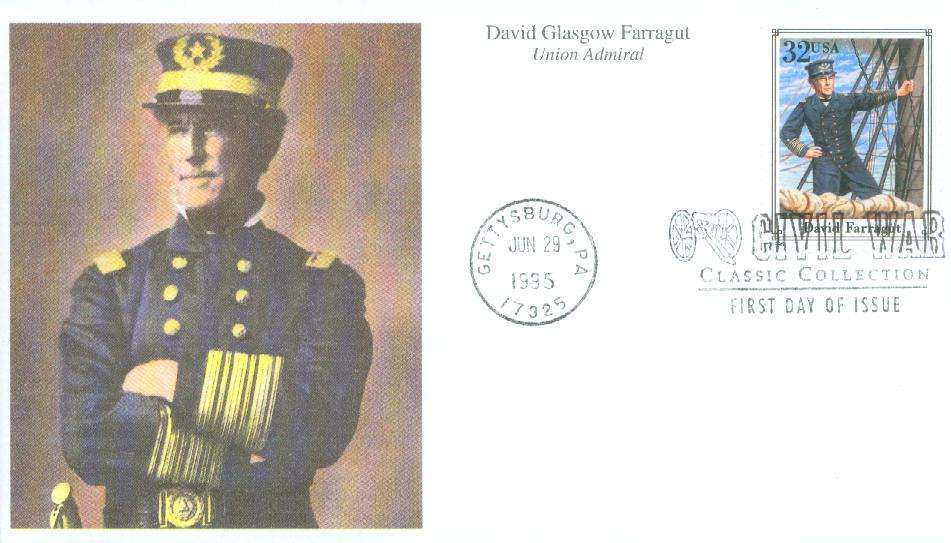
The following year, when Richmond fell, Farragut was one of the first Northern officers to enter the city. And in 1866, Congress created the rank of admiral especially for him. He last saw active service commanding the European Squadron from 1867 to 1868. Even after that though, he remained on active duty (an honor he shares with only seven other US Naval officers). Farragut died on August 14, 1870, in Portsmouth, New Hampshire.
Series of 1902-03 $1 Farragut
Quantity issued: 504,374
Printed by: Bureau of Engraving and Printing
Method: Flat plate
Watermark: Double line
Perforation: 12
Color: Black
Birth of David Farragut
Born to a veteran of the Continental Navy, Farragut’s first name was initially James. After his mother died from yellow fever, Farragut’s father sent him to live with friends in 1808, whom he believed would provide better care. So Farragut was raised by naval officer David Porter and was a foster brother to David Dixon Porter and William D. Porter. In 1812, Farragut adopted David as his first name in honor of his foster father.
Farragut began his naval career at the age of nine as a midshipman. Within two years he was a prize master and then served aboard the USS Essex during its capture of the HMS Alert. From there, he went on to aid in the establishment of America’s first naval base and colony in the Pacific, Fort Madison.

After the War of 1812, Farragut served on various ships, mostly in the Mediterranean. In 1823, he sailed to the Caribbean to help fight pirates, and during the Mexican-American War, he saw duty on both sea and shore. Following that war, he was tasked with establishing Mare Island Navy Yard in California.

At the outbreak of the Civil War, Farragut showed his loyalty to the Union when he gave up his home in Norfolk, Virginia, to fight for the North. He was then placed in command of the campaign to capture New Orleans and gain control of the Mississippi as part of the West Gulf Blockading Squadron. He took the USS Hartford as his flagship.
On April 18, 1862, the ships began bombing two forts near New Orleans. The bombardment lasted for five days with no signs of progress. Farragut was commanding the squadron and decided to sail past the forts at night. His successful plan forced the surrender of Fort Jackson, Fort St. Philip, and New Orleans. For two years he blockaded the Gulf Coast and controlled river traffic.
In 1864, the Confederacy still held the port of Mobile Bay. It was heavily mined with anchored bombs known as torpedoes and protected by two forts. That August, Farragut was ordered to capture Mobile Bay. When his ironclad Tecumseh was sunk by a torpedo, Farragut was warned that Fort Morgan’s guns, as well as those from the Confederate Tennessee, were directed at his fleet. “Damn the torpedoes,” he replied, “Full speed ahead!”

Watching the enemy approach, Confederate Admiral Franklin Buchanan readied his flagship, the ironclad CSS Tennessee. Mobile Bay was the last Confederate-controlled port east of the Mississippi and Buchanan had to defend it.

Buchanan faced off with Farragut. A direct collision would sink both ships, but the Hartford veered at the last second. The two ships passed so close that the men shouted insults, and a Confederate bayonet speared a Union sailor. Once past the Hartford, the fearless Tennessee was surrounded by the Union fleet and pressed to surrender.
Although the battle lasted only three hours, the Union victory at Mobile Bay was significant. With the Union Army at her gates, the Confederacy dared not divert forces or weapons from Mobile, leaving other campaigns short-handed. This victory was a turning point in the war because it cut off an important supply route for the South. Union victory in the Civil War would follow within a year.

The following year, when Richmond fell, Farragut was one of the first Northern officers to enter the city. And in 1866, Congress created the rank of admiral especially for him. He last saw active service commanding the European Squadron from 1867 to 1868. Even after that though, he remained on active duty (an honor he shares with only seven other US Naval officers). Farragut died on August 14, 1870, in Portsmouth, New Hampshire.



